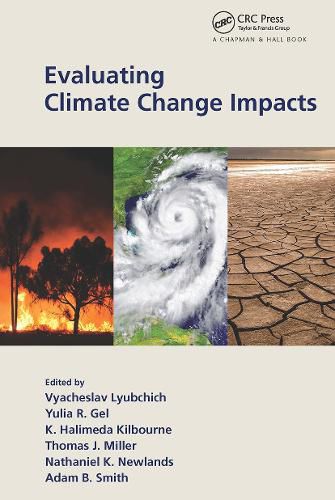Readings Newsletter
Become a Readings Member to make your shopping experience even easier.
Sign in or sign up for free!
You’re not far away from qualifying for FREE standard shipping within Australia
You’ve qualified for FREE standard shipping within Australia
The cart is loading…






Evaluating Climate Change Impacts discusses assessing and quantifying the climate change and its impacts from a multi-faceted perspective of ecosystem, social and infrastructure resilience, given through a lens of statistics and data science. It provides a multi-disciplinary view on the implications of climate variability and shows how the new data science paradigm can help us to mitigate climate-induced risk and to enhance climate adaptation strategies.
The book consists of chapters solicited from leading topical experts and presents their perspectives on climate change effects in two general areas: natural ecosystems and socio-economic impacts. The chapters unveil topics of atmospheric circulation, climate modeling and long-term prediction; approach the problems of increasing frequency of extreme events, sea level rise, forest fires, as well as economic losses, analysis of climate impacts for insurance, agriculture, fisheries, and electric and transport infrastructures. The readers will be exposed to the current research using a variety of methods from physical modeling, statistics, and machine learning, including the global circulation models (GCM) and ocean models, statistical generalized additive models (GAM) and generalized linear models (GLM), state space and graphical models, causality networks, Bayesian ensembles, a variety of index methods and statistical tests, and machine learning methods. The reader will learn about data from various sources, including GCM and ocean model outputs, satellite observations, data collected by different agencies and research units. Many of the chapters provide references to open source software R and Python code that are available for implementing the methods.
$9.00 standard shipping within Australia
FREE standard shipping within Australia for orders over $100.00
Express & International shipping calculated at checkout
Evaluating Climate Change Impacts discusses assessing and quantifying the climate change and its impacts from a multi-faceted perspective of ecosystem, social and infrastructure resilience, given through a lens of statistics and data science. It provides a multi-disciplinary view on the implications of climate variability and shows how the new data science paradigm can help us to mitigate climate-induced risk and to enhance climate adaptation strategies.
The book consists of chapters solicited from leading topical experts and presents their perspectives on climate change effects in two general areas: natural ecosystems and socio-economic impacts. The chapters unveil topics of atmospheric circulation, climate modeling and long-term prediction; approach the problems of increasing frequency of extreme events, sea level rise, forest fires, as well as economic losses, analysis of climate impacts for insurance, agriculture, fisheries, and electric and transport infrastructures. The readers will be exposed to the current research using a variety of methods from physical modeling, statistics, and machine learning, including the global circulation models (GCM) and ocean models, statistical generalized additive models (GAM) and generalized linear models (GLM), state space and graphical models, causality networks, Bayesian ensembles, a variety of index methods and statistical tests, and machine learning methods. The reader will learn about data from various sources, including GCM and ocean model outputs, satellite observations, data collected by different agencies and research units. Many of the chapters provide references to open source software R and Python code that are available for implementing the methods.